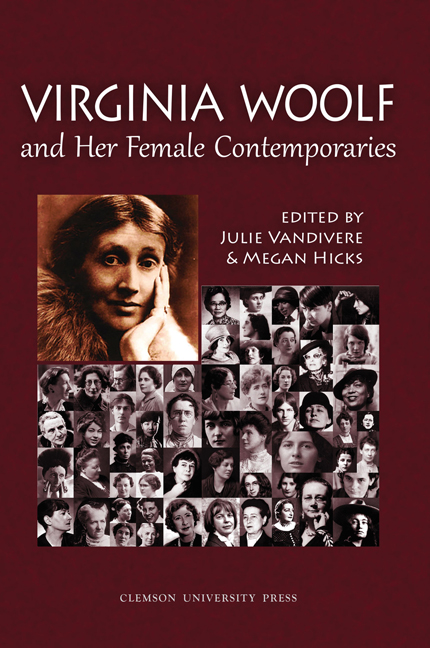Book contents
- Frontmatter
- Table of Contents
- Introduction
- Acknowledgments
- Abbreviations
- Who Are Virginia Woolf's Female Contemporaries?
- Virginia Woolf's Cultural Contexts
- Virginia Woolf's Contemporaries Abroad
- Virginia Woolf's Contemporaries at Home
- “The Squeak of a Hinge”: Hinging and Swinging in Woolf and Mansfield
- “People must marry”: Queer Temporality in Virginia Woolf and Katherine Mansfield
- The Weight of “Formal Obstructions” and Punctuation in Mrs. Dalloway and Pointed Roofs
- Advise and Reject: Virginia Woolf, the Hogarth Press, and a Forgotten Woman's Voice
- Florence Melian Stawell and Virginia Woolf: Home-front Experience, The Price of Freedom, and Patriotism
- Intimations of Cosmic Indifference in Virginia Woolf 's Orlando and Olive Moore's Spleen
- “Could I sue a dead person?”: Rebecca West and Virginia Woolf
- Splintered Sexualities in Rebecca West's The Return of the Soldier, Virginia Woolf 's Mrs Dalloway, and Sylvia Townsend Warner's “A Love Match”
- Sexual Cryptographies and War in Virginia Woolf 's Between the Acts and Elizabeth Bowen's The Heat of the Day
- Tribute to Jane Marcus
- Notes on Contributors
- Conference Program 223
“Could I sue a dead person?”: Rebecca West and Virginia Woolf
from Virginia Woolf's Contemporaries at Home
- Frontmatter
- Table of Contents
- Introduction
- Acknowledgments
- Abbreviations
- Who Are Virginia Woolf's Female Contemporaries?
- Virginia Woolf's Cultural Contexts
- Virginia Woolf's Contemporaries Abroad
- Virginia Woolf's Contemporaries at Home
- “The Squeak of a Hinge”: Hinging and Swinging in Woolf and Mansfield
- “People must marry”: Queer Temporality in Virginia Woolf and Katherine Mansfield
- The Weight of “Formal Obstructions” and Punctuation in Mrs. Dalloway and Pointed Roofs
- Advise and Reject: Virginia Woolf, the Hogarth Press, and a Forgotten Woman's Voice
- Florence Melian Stawell and Virginia Woolf: Home-front Experience, The Price of Freedom, and Patriotism
- Intimations of Cosmic Indifference in Virginia Woolf 's Orlando and Olive Moore's Spleen
- “Could I sue a dead person?”: Rebecca West and Virginia Woolf
- Splintered Sexualities in Rebecca West's The Return of the Soldier, Virginia Woolf 's Mrs Dalloway, and Sylvia Townsend Warner's “A Love Match”
- Sexual Cryptographies and War in Virginia Woolf 's Between the Acts and Elizabeth Bowen's The Heat of the Day
- Tribute to Jane Marcus
- Notes on Contributors
- Conference Program 223
Summary
Jane Garrity has asked whether “Virginia Woolf syndrome” might explain the relative lack of attention paid to Woolf 's female contemporaries (17). It is startling to hear Woolf posited as a bogey for women writers in the way that Woolf herself, in A Room of One's Own (1929), referred to the deleterious effects of Milton. I'll return to A Room shortly, in which text Rebecca West is the only contemporary woman writer named, but first I will review some of the interactions between Woolf and West.
They met infrequently; they said mean things about one another, as well as deeply admiring things. To Woolf, Rebecca West was a “celebrity” and also a somewhat aggressive figure; to West, Virginia Woolf was a great genius and also a mad woman. West's reviews of Jacob's Room (1922), Orlando (1928), A Room, and The Waves (1931) are profound and insightful.
Jane Marcus has even suggested they were in many ways responsible for making Woolf 's reputation (42). West's review of Orlando elicited from Woolf a letter of thanks that was one of two letters West framed and hung by her desk for the rest of her life (the other was from Lawrence). Yet, throughout their sporadic acquaintance, there remained always a wariness, almost a suspicion, a sense of a barrier that if breached might lead to a deeper intimacy, but neither seems to have known a way through or around that barrier.
Two examples must suffice to illustrate this unrealized potential for a greater intimacy. Early in February 1935, Woolf wrote to West in praise of The Harsh Voice and noted in her diary that at her sister's house they had been talking about how writers do appreciate getting such letters. But Rebecca did not reply. Woolf wondered if, meaning to praise, she had somehow given offense. “But its no great matter,” she wrote on February 2; “My conscience…is clear” (D4: 277). On February 5, she wondered in her diary why she minded so much that she had had no reply from West, and decided that this was perhaps to be expected from someone with a “queer ill bred mind” (D4: 277), a phrase remarkably similar to that with which she described James Joyce (and for which Woolf continues to be punished).
- Type
- Chapter
- Information
- Virginia Woolf and Her Female Contemporaries , pp. 189 - 195Publisher: Liverpool University PressPrint publication year: 2016



